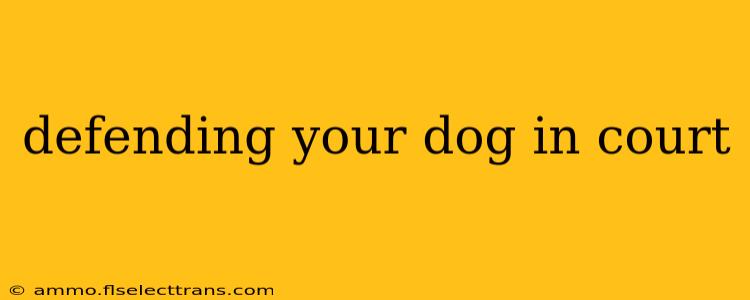Losing your beloved canine companion can be devastating, but facing legal action related to your dog adds another layer of stress. Whether it's a bite incident, property damage, or a violation of local ordinances, understanding the legal process and how to effectively defend your dog is crucial. This guide provides a comprehensive overview of navigating the legal complexities of defending your furry friend.
Understanding the Potential Legal Issues
Several scenarios can lead to legal action involving your dog. The most common include:
1. Dog Bites
Dog bites are a frequent cause of legal trouble. Liability often falls on the dog owner, regardless of the dog's history or the circumstances. The severity of the bite, the victim's injuries, and the owner's negligence will all play a role in determining liability and potential damages.
2. Property Damage
Dogs can cause significant property damage, from digging up gardens to destroying fences. If your dog causes damage to someone else's property, you may be held responsible for the repair costs. This is especially true if you knew your dog had a propensity for destructive behavior.
3. Violation of Local Ordinances
Many municipalities have ordinances regulating dog ownership, including leash laws, breed restrictions, and licensing requirements. Violating these ordinances can result in fines or even the seizure of your dog.
4. Negligence Claims
If someone alleges that your dog caused harm due to your negligence (e.g., failing to properly restrain your dog, ignoring known aggressive behavior), you could face a negligence claim.
Building Your Defense
Successfully defending your dog in court requires careful preparation and a strategic approach:
1. Gather Evidence
Document everything related to the incident. This includes:
- Photographs and videos: Capture evidence of the scene, injuries, and your dog's behavior.
- Witness statements: Obtain written statements from anyone who witnessed the incident.
- Veterinary records: If your dog was involved in a bite, provide records detailing its health and vaccination history.
- Training records: Demonstrate your commitment to responsible dog ownership by providing records of obedience training or behavior modification sessions.
- Local ordinances: Familiarize yourself with all relevant local ordinances concerning dog ownership.
2. Consult with a Lawyer
Legal representation is essential. A lawyer specializing in animal law can advise you on your rights and responsibilities, help you gather evidence, and represent you in court. They can also negotiate settlements to avoid a trial.
3. Demonstrate Responsible Ownership
Highlight your efforts to be a responsible dog owner. This includes:
- Proper licensing and vaccination: Show proof of compliance with local regulations.
- Training and socialization: Provide evidence of your dog's training and positive socialization efforts.
- Consistently using leashes and other restraints: Demonstrate your commitment to responsible restraint.
- Maintaining a safe environment: Show that you took reasonable steps to prevent incidents, such as using fences or secure enclosures.
4. Consider Insurance
Pet insurance can help cover legal fees and damages resulting from accidents involving your dog. Many homeowner's or renter's insurance policies also offer liability coverage for pet-related incidents.
Preparing for Court
If your case proceeds to court, you’ll need to prepare thoroughly. Your lawyer will guide you through this process, but some key aspects include:
- Understanding the legal process: Familiarize yourself with the court procedures and rules of evidence.
- Preparing your testimony: Practice your testimony carefully to ensure clarity and consistency.
- Presenting your evidence: Organize your evidence logically and effectively for presentation in court.
Conclusion
Facing legal action involving your dog can be stressful, but by understanding the legal process, gathering evidence, and seeking legal counsel, you can significantly improve your chances of a favorable outcome. Remember, responsible dog ownership is key to preventing legal issues and protecting both your dog and yourself. By taking proactive measures and demonstrating your commitment to responsible pet ownership, you can build a strong defense and protect your furry friend.

